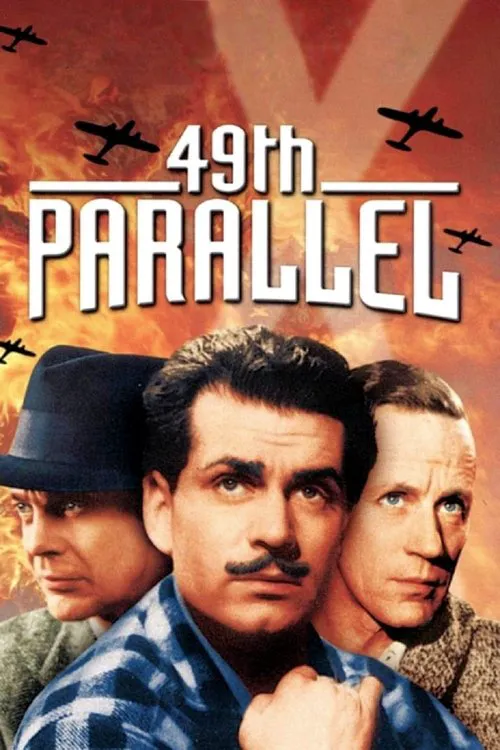49th Parallel

Plot
In 1942, the world is still reeling from the devastating effects of World War II. Canada, located at the northern tip of North America, has officially joined the Allies but the United States, its southern neighbor, remains technically neutral. This neutrality allows the German military to see Canada as a weak point in the Allies' defenses and an opportunity for their U-boats to resupply and regroup. Deep in Canada's Hudson Bay, a German U-boat, the U-69, is sunk by the British Royal Canadian Air Force. Among the U-boat's crew are a handful of survivors who find themselves stranded on the Canadian shoreline. Their leader, Lieutenant Hirth (a character inspired by the real-life German intelligence officers who operated in Canada), quickly assesses the situation and realizes they must escape or risk being captured by the Allies. The group of German soldiers, totaling seven men, sets out on a perilous journey across the Canadian wilderness. They hope to reach the United States before they can be identified and apprehended by Canadian authorities. As they navigate the treacherous terrain, they come face-to-face with a series of brave men who will challenge their Nazi ideology and ultimately change the course of their journey. First, they encounter Johnnie, a rugged and seasoned French-Canadian fur trapper who has lived his entire life in the wilderness. Johnnie, with his bushcraft skills and deep knowledge of the land, tries to guide the German soldiers across the border, but they soon discover he is not who he seems. Despite his rough demeanor, Johnnie is fiercely loyal to his country and refuses to assist the fugitives. The Germans continue their journey, unaware that their presence has set off a chain reaction of events. In Manitoba, they stumble upon a Hutterite farming community, led by Peter, who lives according to traditional Christian values and a strong sense of community. Peter, initially wary of the Germans, becomes disillusioned with their aggressive nationalism and the atrocities they have committed. He eventually decides to report their presence to the authorities. As the Germans push westward, they meet an American named Andy Brock, a soldier on leave who has returned to his home in the United States. Andy is an odd character, more obsessed with his own heroism than the reality of the situation. He joins the Germans, convinced that they will help him gain fame and fortune, but his actions ultimately backfire when he attempts to steal from them and is caught. Meanwhile, an author named Philip Ashley, an American intellectual, has heard rumors of the German soldiers' presence. He sets out to track them down, driven by a mix of intellectual curiosity and desire to understand the Nazi ideology. Along the way, he engages in a series of lively debates with Peter and others, challenging their views on war, nationalism, and the role of the individual. Through the encounters with these brave men, the German soldiers are forced to confront their own ideology and the brutal consequences of their actions. The character of Lieutenant Hirth, the group's leader, grapples with the moral complexities of his own role in the war. He begins to see the world through a different lens, one in which the Nazi regime is not the only authority, but rather a part of a larger web of ideologies that shape humanity. As the story unfolds, it becomes clear that the U-boat survivors are not the only ones with a mission. The men they encounter, from Johnnie to Peter and Philip, are driven by a similar sense of purpose: to challenge the Nazi ideology and stand up for their own values and ideals. The film's title, 49th Parallel, refers to the border between Canada and the United States. The U-boat survivors, hoping to escape into the United States, are forced to confront the moral complexities of the borderlands, a region where two very different nations meet. Through this compelling narrative, Michael Powell and Emeric Pressburger's 1941 film 49th Parallel presents a powerful critique of fascist ideology and the rise of totalitarianism. By humanizing the German soldiers and challenging their views on war and nationalism, the film creates a sense of empathy and understanding, one that transcends the boundaries of nationality and ideology. Ultimately, the German soldiers' attempts to evade capture are thwarted by the brave men they encounter along the way. The film ends with the survivors being taken into custody by the Canadian authorities, a poignant reminder of the power of resistance and the strength of the human spirit.
Reviews
Recommendations




